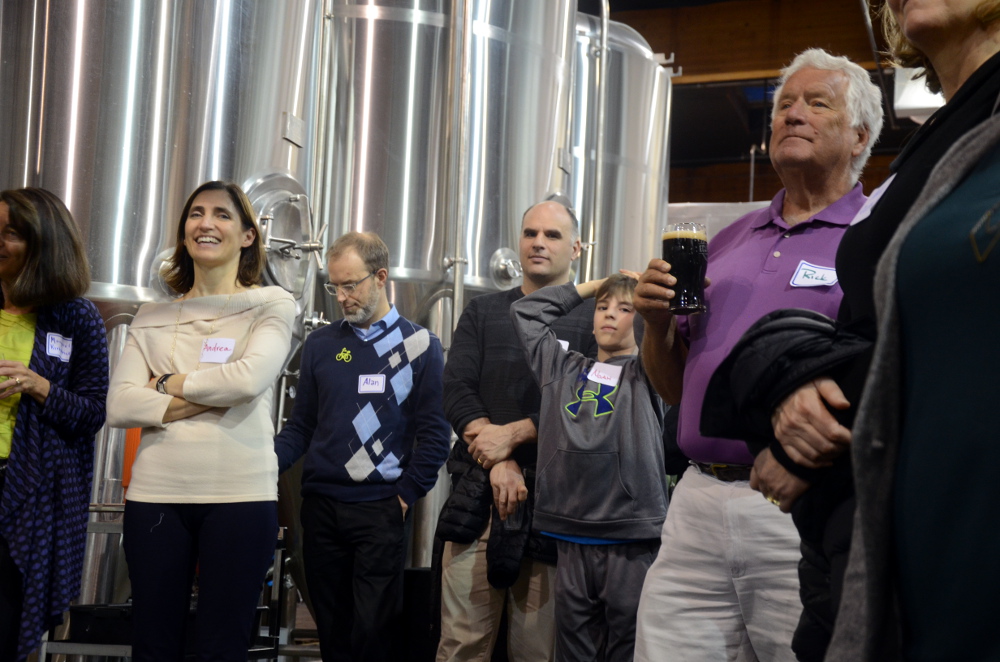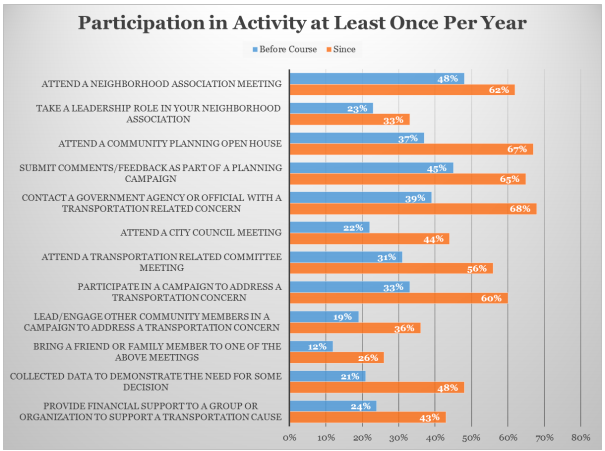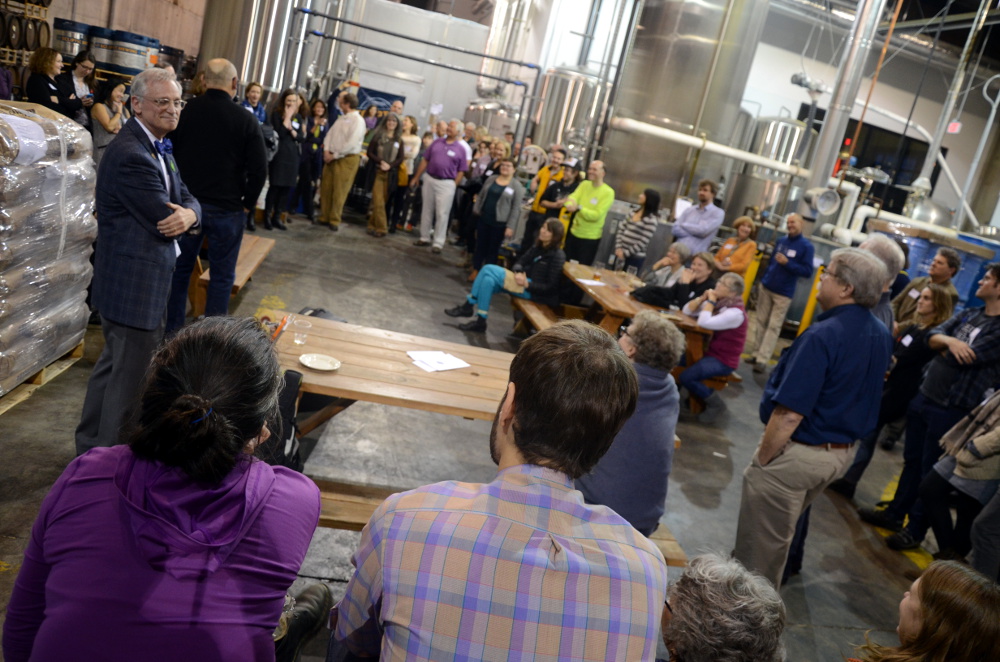
(Photos: M.Andersen/BikePortland)
The one-of-a-kind free transportation class funded by the Portland Bureau of Transportation is celebrating a quarter century of enlightened change.
When they finish, people who take the course become 29 percent more likely to get involved in their neighborhood association, 89 percent more likely to lead a campaign to make a transportation change and twice as likely to attend a city council meeting.
Created in 1991 by then-Transportation Commissioner Earl Blumenauer, the annual class costs the city $8,000 a year and has so far churned out 1,200 graduates of a 10-week evening course that introduces interested residents to the history, theory and victories of Portland transportation.
Several dozen of those graduates met Tuesday night at Ecliptic Brewing for a party hosted by Blumenauer, now a U.S. congressman, to honor the class and its founding instructor Rick Gustafson.
Gustafson, a friend of Blumenauer’s since they were high school classmates in Gresham, rose beside him through city politics and has served in many roles, including as a state legislator and the first elected executive of the Metro regional government.
Now a streetcar consultant, Gustafson continues to teach the course each fall and taps a contact list of prominent Portlanders to steep the class in the Portland story — and also offer advice on how to work the system for change.

For a final project, people who take the course are invited to deliver a detailed presentation about something they’d like to change in Portland’s transportation system. (And, crucially, city staffers are under standing orders to respond to their questions.)
When they finish, people who take the course become 29 percent more likely to get involved in their neighborhood association, 89 percent more likely to lead a campaign to make a transportation change and twice as likely to attend a city council meeting.

That’s the finding of a 2015 study of the class by Portland State University scholar Nathan McNeil. His research was funded through the Transportation Research and Education Center at PSU.
The findings weren’t all rosy. McNeil’s survey of the class’s alumni — who, I should disclose, include me — clearly show that the course is used mostly by relatively privileged people. Homeowners and higher-income people were overrepresented among alumni who responded to McNeil’s survey; white people and educated people were greatly overrepresented. A grand total of zero alumni surveyed by McNeil identified as black.
Some (though not all) of that problem probably reflects the social networks of people who’ve learned about the course, which has never had much of a marketing budget. By far the most common way for people to learn about the course was word of mouth. The second most common way: a blog or listserv.
Advertisement
In an interview Tuesday, Blumenauer said he created the class basically as a defensive posture after being tapped to run the city’s public works department. He wanted a place to point the people who came to him with complaints.
“About 6.5 minutes after I got the appointment from [then-Mayor] Bud [Clark], people had figured out that I could do something about where a stop sign could go,” Blumenauer said. “It was clear that a lot of what they knew about transportation wasn’t true. So I had been obsessed with an opportunity for anyone to do a deep dive to understand these dynamics.”
In exchange for getting people to promise to take the new course, Blumenauer promised to visit the final class and hear the best ideas of its graduates. That’s a tradition that continues today; the city’s transportation director and commissioner typically send representatives to evaluate final presentations.
Over the last 25 years, dozens of those final projects have doubtless taken some sort of root around the city. You know the covered seating area in front of Mississippi Pizza? That happened because my 2010 classmate Rebecca Hamilton (then an activist, now a planner at Metro) spent months lobbying the restaurant’s owner to create the first of what became the city’s Street Seats program.
“I had high hopes, but it worked out better than I have ever hoped. … The thing I’m as proud of of anything I’ve done is this class.”
— Congressman Earl Blumenauer
Today it’s just one example of the class paying off for the city. Surely readers will know of others.
“I had high hopes, but it worked out better than I have ever hoped,” Blumeneauer said. “The thing I’m as proud of of anything I’ve done is this class.”
Despite the fact that that Congressman talks it up every chance he gets on his travels around the country, he’s not aware of any other city that has replicated it.
That might yet change. Part of McNeil’s project was to create a handbook for other cities that want to imitate the program.
In an email Tuesday, McNeil said he’s “working with TREC on identifying a few other cities to help implement the curriculum and get their own courses off the ground.”
And if you happen to live in Portland, it’s never too early to apply for a free seat in this year’s class.
— Michael Andersen, (503) 333-7824 – michael@bikeportland.org
BikePortland can’t survive without paid subscribers. Please sign up today.


